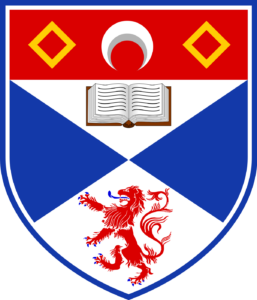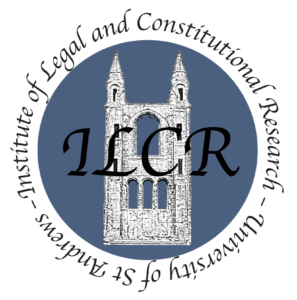British Legal History Conference 2019
What does Scotland’s Earliest Legal Tractate Actually Say (and What Does it Mean)?
Alice Taylor (King’s College, London)
Constitutional History, as History
Janet McLean (Auckland)
What Makes a Marriage? Religion, the State, and the Individual in the Long Nineteenth Century
Rebecca Probert (Exeter)
James VI and I, Rex et Iudex:
One King as Judge in Two Kingdoms
Ian Williams (UCL)
The twenty-fourth British Legal History Conference was held in St Andrews, 10–13 July 2019. The organizing team welcomed over 200 delegates to St Salvator’s Quadrangle in St Andrews, where almost 80 speakers across 24 panels and four plenary sessions spoke about the conference’s theme ‘Comparative Legal History’.
The first day started with parallel sessions on topics in medieval, early modern and modern legal history, followed by the first keynote, given by Alice Taylor (King’s College, London), who spoke about the Scottish legal tractate Regiam Majestatem, asking the question ‘What’s does Scotland’s earliest legal tractate actually say (and what does it mean)?’. The day ended with a wine reception in Lower College Hall and sunny Sallie’s Quad.
The next morning saw everyone reconvene for the second plenary session, where Janet McLean (Auckland) presented on ‘Constitutional History, as History’. A day of parallel sessions followed, with panels on, among many other things, William Blackstone, medieval wills and testamentary cases, Scottish law, colonial and wartime law, as well as early medieval Irish and English law. Thanks to the unusually accommodating weather gods, delegates were invited to a wine reception in St John’s Garden at the Department of Medieval History, before setting off to enjoy an evening in St Andrews.
The third day started with another round of parallel sessions on late medieval English, Tudor and colonial law, before Rebecca Probert (Exeter) gave the third plenary talk: ‘What Makes a Marriage? Religion, the State, and the Individual in the Long Nineteenth Century’. The start of the afternoon was set aside for a walking tour of St Andrews, with Dr Bess Rhodes telling the fascinating medieval and Reformation story of the town. The final part of the day saw the third plenary session, which offered something different, namely legal practitioners, who spoke about legal history and their own work in various parts of the legal system. The panel was made up of Justice Geoff Lindsay from the Supreme Court of New South Wales, Lorna Drummond QC, Sheriff of Tayside and Fife, and Hector McQueen, formerly of the Scottish Law Commission.
Another evening saw another wine reception, kindly sponsored by the Journal of Legal History, before the conference dinner was held in Lower College Hall, where it was also announced that the 2021 BLHC will be held in Belfast. A tremendously successful ceilidh put a fitting end to the final full day of the conference.
After an evening of Gay Gordons and Dashing White Sergeants, delegates reconvened for a final morning of parallel sessions with papers on topics such as maritime law, divorce law and language choices in medieval law. The final plenary – and the final session of the conference – was given by Ian Williams (UCL), on ‘James VI and I, Rex et Iudex: One King as Judge in Two Kingdoms’.

Funded by a European Research Council ‘Advanced Grant’ of €2,161,501. (Grant agreement number: 740611 CLCLCL).

